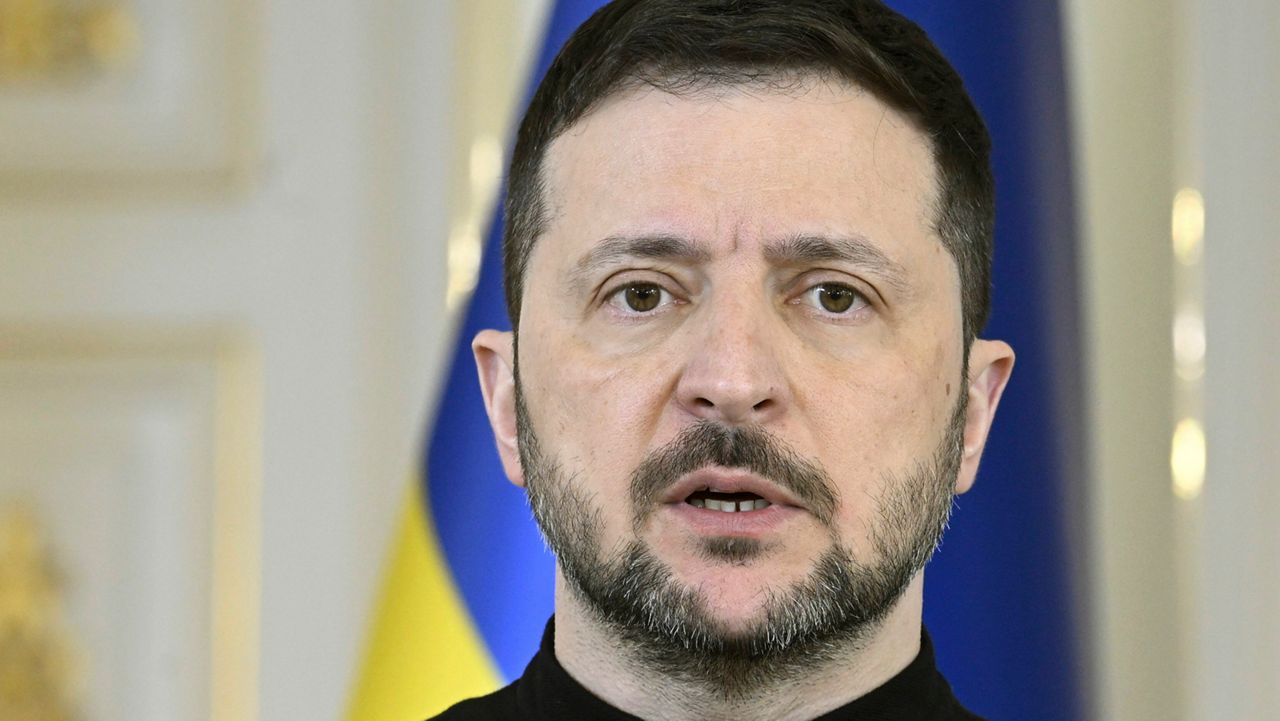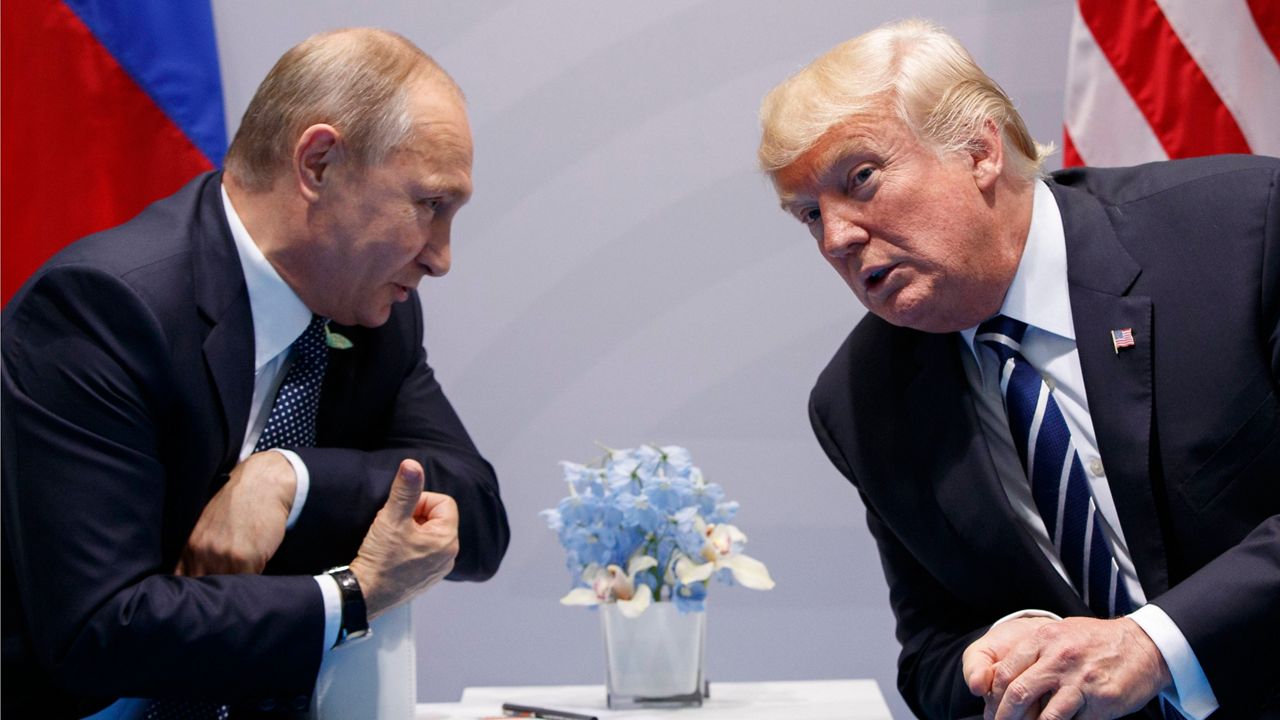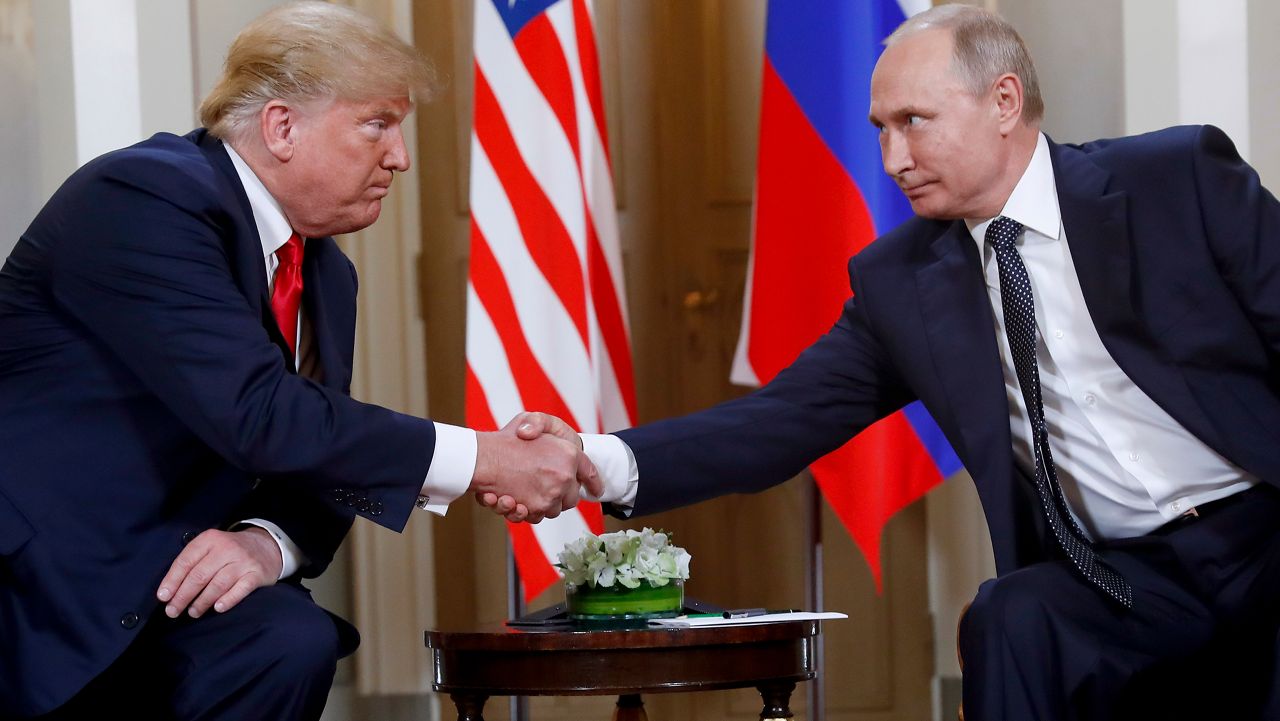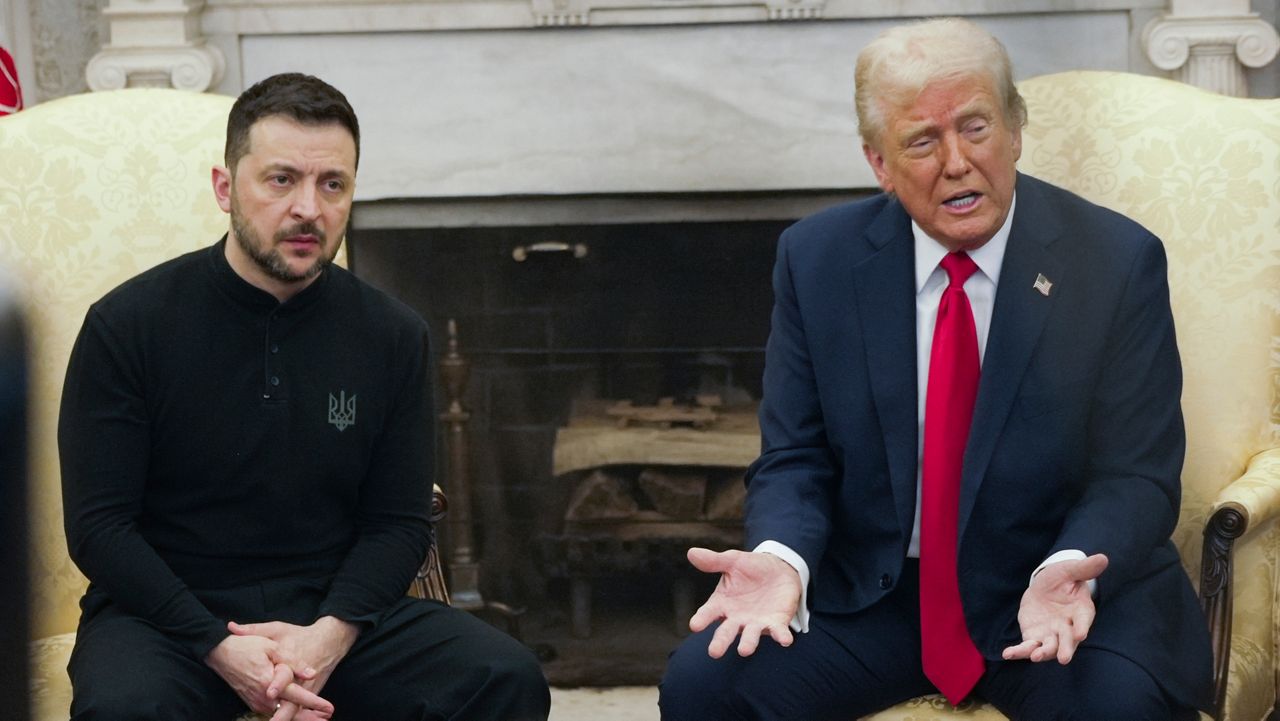The White House said on Tuesday a ‘major sanctions package’ will be announced on Friday, punishing Russia for the death of opposition leader Alexei Navalny and its nearly two-year-old invasion of Ukraine.
Navalny, an anti-corruption crusader who antagonized Russian President Vladimir Putin for years, died last week in an Arctic penal colony 1,200 miles northeast of Moscow. Russian authorities said he collapsed while on a walk, but have yet to announce a cause of death. Navalny’s family members and supporters in Europe and the U.S. have laid blame for the 49 year old’s demise at Putin’s feet.
“Whatever story the Russian government decides to tell the world, it's clear that President Putin and his government are responsible for Mr. Navalny’s death,” White House National Security Council spokesperson John Kirby said on a press call. “We will be announcing a major sanctions package on Friday of this week to hold Russia accountable for what happened to Mr. Navalny. And quite frankly, for all its actions over the course of this vicious and brutal war [in Ukraine] that has now raged on for two years.”
Kirby had virtually no details to provide publicly on the sanctions, beyond saying they were motivated by Navalny’s death and the invasion of Ukraine. The U.S. has enacted thousands of sanctions on Russian individuals and entities since the full-scale war began in February 2022, building on other sanctions that were implemented after fighting kicked off in eastern Ukraine in 2014.
White House national security adviser Jake Sullivan said that he believes the sanctions "will have an impact."
"It will be a substantial package covering a range of different elements of the Russian defense industrial base and sources of revenue for the Russian economy that power Russia's war machine, that power Russia's aggression and that power Russia’s repression," Sullivan pledged.
Imprisoned since returning to Russia in 2021 after being poisoned and nearly killed by a Soviet-era nerve agent, Navalny has long accused the government there of depriving him of medical treatment and treating him to harsh prison conditions. Meanwhile the war in Ukraine has seen Russian forces make key advances as it approaches its two-year anniversary on Feb. 24. Over the weekend, they claimed the eastern city of Avdiivka in the Donbas region, which has seen the fiercest fighting of the war, killing tens of thousands, according to Ukrainian, Russian and independent sources.
Navalny and his Russian allies waged a political and media war on Russian state corruption and Putin’s authoritarianism since the mid-2000s, facing criminal charges, house arrest, bans from using the internet, chemical attacks, disqualification for running for president and other elected office, and an attempted assassination using the nerve agent Novichok in 2020. After five months of recovery in Germany, Navalny returned to Russia and was immediately arrested, remaining in prison ever since.
Navalny received decades of prison sentences for what western leaders and Russian opposition figures described as trumped up charges, including embezzlement and extremism. Increasingly gaunt at public court appearances, Navalny lasted around three years in the punishing Russian prison system. His final destination was 1,200 miles northeast of Moscow, above the Arctic Circle.
“Regardless of the of the actual scientific answer, Mr. Putin is responsible for” Navalny’s death, Kirby said, echoing Biden’s comments last week. “But absent some credible investigation into his death. It's hard to get to a point where, you know, we can just take the Russians’ word for it. So clearly, we’re calling for complete transparency by the Russian government.”
In an interview Tuesday, Sean Savett, deputy spokesman for the National Security Council, said that while he wouldn't describe the new sanctions as a "escalation" into the United States' efforts to impose consequences on Russia, they would serve as a "major response" to the death of Navalny.
Savett confirmed that there were "sanctions in the works already" related to the 2-year anniversary of Russia's invasion of Ukraine, but they've been updated and escalation to respond to the latest development.
"The goal," he said, "is to continue to increase the costs on Russia for this brutal and vicious war that they are carrying out on Ukraine, and to make it more difficult, to disincentivize them, from continuing the war and to make it more difficult for them to carry out this war."
"We're going to continue to raise costs until this war ends," Savett continued. "And until Russia withdraws from Ukrainian territory, we also think it's incredibly important to help the Ukrainian people who are fighting for their lives probably every single day."
Kirby did not answer a question on whether the U.S. will recognize the results of Russia’s presidential elections next month as legitimate, something Navalny’s widow, Yulia Navalnaya, has pushed for. Putin has led Russia as president or prime minister since 1999 and the Russian government has repeatedly changed the rules and disqualified potential opponents to ensure his continued rule.
While sanctions are a tool to attempt to restrict and hinder Putin’s regime, Kirby said, the best way the U.S. can help Ukraine is by passing the foreign aid package that would allocate billions in military and humanitarian aid to the country, as well as funding other foreign policy priorities. The package has made its way through the Democratic-controlled Senate with bipartisan support, but now faces peril in an increasingly isolationist GOP-controlled House.
“One of the most powerful things that we can do right now to stand up to Vladimir Putin, of course, is to again pass the bipartisan national security supplemental bill and support Ukraine as they continue to fight bravely in defense of their country,” Kirby said. “They need those resources, and we need Congress to do its job and pass that supplemental bill.”
“The Ukrainian troops on the battlefront are literally running out of ammunition and having to give up defensive positions to the Russians,” he added. “They're having to make the impossible decisions on the battlefield of whether they're going to fire this or fire that and who they're going to shoot at and how many… artillery shells they’re going to use. We’re at a critical time.”
"The costs of inaction are going to be even higher, and the cost to America, to our national security and the security of our allies and partners will be even higher if we walk away," Savett warned. "Unfortunately, we know from history that dictators don't stop, they just keep going. And if we don't stand up to Putin now, and if we don't send Ukraine weapons and resources to help them fight off Russian forces ... if we walk away now, and we let Putin take Ukraine,, he has his eye on other countries as well, some of whom are our NATO allies in Eastern Europe. Those are countries that we're treaty-bound to defend, and the costs of that would be much, much higher in both financial resources and also in human lives."
"We think it's incredibly important to send a message to Putin that he cannot conquer Ukraine," he added.
Ukrainian President Volodymyr Zelenskyy said after Avdiivka fell into Russian hands that an “artificial deficit” in ammunition and weaponry was hindering his country’s war effort. And on Monday he said Russia was taking advantage of Ukraine’s supply shortages as U.S. aid has dried up.
“The situation is extremely difficult in several parts of the frontline, where Russian troops have amassed maximum reserves. They are taking advantage of the delays in aid to Ukraine,” he said in recorded remarks to the nation, according to an English transcript provided by his office. “These are very tangible issues. There is a deficit of artillery. There is a need for frontline air defense and for a longer range of our weapons. We are working with our partners as hard as possible to resume and extend support.”
He added he wanted to “thank each and everyone in the United States who cherish freedom just as Ukrainians do, and Mr. President Biden and the Administration, and everybody in the U.S. Congress who helps, and to all our partners worldwide.”
On Monday, Biden said he would meet with House Speaker Mike Johnson, R-La., who has opposed the standalone foreign aid bill, “if he has anything to say.” Johnson requested a meeting with Biden as his majority remains fractured on the issue of continuing to support Ukraine financially, particularly as former President Donald Trump has expressed his opposition.
“It's just shocking. I mean, they’re wild,” Biden said, adding Republicans are “making a big mistake not responding” to Navalny’s death.
Biden and his administration have also been making the case that the U.S. does not just cut a check for Ukraine when they supply military aid. Instead, the government sends military equipment it already has stockpiled and then spends the billions allocated by Congress to replenish the U.S. arsenal using weapons “made right here in America by American workers,” Biden said.
Days away from entering its third year, the war in Ukraine has been devastating to the country, with the government and international organizations accusing Russian forces of war crimes, including the removal of tens of thousands of Ukrainian children into Russia. The brutal conflict does not appear to be near an end and negotiations for peace have all but halted.
Zelenskyy’s government does not share casualty numbers, but the New York Times reported U.S. officials believed about 70,000 Ukrainian soldiers had been killed as of August of last year. Russian Defense Minister Sergei Shoigu said in January over 215,000 Ukrainian troops had been killed or injured. Over 10,000 civilians have been killed in the fighting, according to a U.N. report last month.
As for Russian casualties, CIA Director Bill Burns wrote in Foreign Affairs that around 315,000 at the end of January. Russian soldiers have been killed and injured in the fighting. On Sunday, Ukraine’s military said 17,000 Russian soldiers were killed and another 30,000 were injured trying to capture Avdiivka. Russia disputes Ukrainian and western assessments of their troop losses, though they have been far from transparent in offering data of their own. A BBC News Russia collaboration with Mediazona has accumulated a database of 44,654 Russians confirmed dead, noting “the actual death toll is likely significantly higher.”
“Ukraine alone can stop Putin and create conditions for him to be punished for all the evil he has done. But for Ukraine to achieve this success – to protect its land, its people, and our common truth, everyone in the free world – Ukraine must not remain alone,” Zelenskyy said in a Sunday address. “ Support is important. Solidarity is important. Only together, in unity, can we win in this war.”
The Associated Press contributed to this report.









